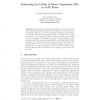Free Online Productivity Tools
i2Speak
i2Symbol
i2OCR
iTex2Img
iWeb2Print
iWeb2Shot
i2Type
iPdf2Split
iPdf2Merge
i2Bopomofo
i2Arabic
i2Style
i2Image
i2PDF
iLatex2Rtf
Sci2ools
158
click to vote
QOFIS
2004
Springer
2004
Springer
Evaluating the Utility of Media-Dependent FEC in VoIP Flows
In this paper, we present an analysis of the impact of using media–dependent Forward Error Correction (FEC) in VoIP flows over the Internet. This error correction mechanism consists of piggy-backing a compressed copy of the contents of packet n in packet n + i (i being variable), so as to mitigate the effect of network losses on the quality of the conversation. To evaluate the impact of this technique on the perceived quality, we propose a simple network model, and study different scenarios to see how the increase in load produced by FEC affects the network state. We then use a pseudo–subjective quality evaluation tool that we have recently developed in order to assess the effects of FEC and the affected network conditions on the quality as perceived by the end–user.
Error Correction | Error Correction Mechanism | Forward Error Correction | Internet Technology | QOFIS 2004 |
| Added | 02 Jul 2010 |
| Updated | 02 Jul 2010 |
| Type | Conference |
| Year | 2004 |
| Where | QOFIS |
| Authors | Gerardo Rubino, Martín Varela |
Comments (0)

